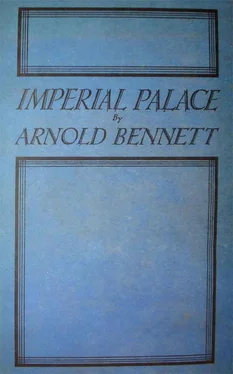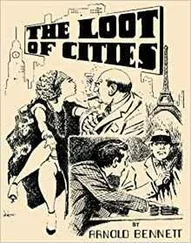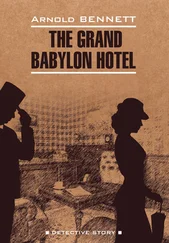Arnold Bennett - Imperial Palace
Здесь есть возможность читать онлайн «Arnold Bennett - Imperial Palace» — ознакомительный отрывок электронной книги совершенно бесплатно, а после прочтения отрывка купить полную версию. В некоторых случаях можно слушать аудио, скачать через торрент в формате fb2 и присутствует краткое содержание. Жанр: unrecognised, на английском языке. Описание произведения, (предисловие) а так же отзывы посетителей доступны на портале библиотеки ЛибКат.
- Название:Imperial Palace
- Автор:
- Жанр:
- Год:неизвестен
- ISBN:нет данных
- Рейтинг книги:4 / 5. Голосов: 1
-
Избранное:Добавить в избранное
- Отзывы:
-
Ваша оценка:
- 80
- 1
- 2
- 3
- 4
- 5
Imperial Palace: краткое содержание, описание и аннотация
Предлагаем к чтению аннотацию, описание, краткое содержание или предисловие (зависит от того, что написал сам автор книги «Imperial Palace»). Если вы не нашли необходимую информацию о книге — напишите в комментариях, мы постараемся отыскать её.
Imperial Palace — читать онлайн ознакомительный отрывок
Ниже представлен текст книги, разбитый по страницам. Система сохранения места последней прочитанной страницы, позволяет с удобством читать онлайн бесплатно книгу «Imperial Palace», без необходимости каждый раз заново искать на чём Вы остановились. Поставьте закладку, и сможете в любой момент перейти на страницу, на которой закончили чтение.
Интервал:
Закладка:
One or two shareholders clapped, but, finding themselves unsupported, ceased abruptly.
III
“Good old platitudes!” thought Evelyn, as he sat down relieved at having safely accomplished his speech, and he surreptitiously winked at smiling father Dennis. The meeting was finished, save for questions and formalities. “And these people in front will go home feeling that they’ve done something important!” thought Evelyn.
The Chairman asked drily:
“Any questions, ladies and gentlemen?”
A mature lady rose and with a self-possession unusual and perhaps indecorous in a shareholder of her sex asked why in the Profit and Loss account all payments—wages, salaries, washing, licences, advertising, bands, fees, liveries, insurance, stationery, electric light, repairs, renewals, etc., etc., etc., etc., etc.—were lumped together in one huge item. To which the Chairman responded that such was the universal custom in Profit and Loss accounts of limited companies.
The lady’s question was a very justifiable one; it jabbed a hole in the beautiful convention which regulates the pacific union between shareholders and Board. Many shareholders would have liked further illumination of the subject. Some knew the right answer. But as the lady wore an eyeglass, a starched white collar and a sailor’s-knot tie, she got no help; the subject was not further illuminated, and feminine curiosity, which had thus flouted the sacred immemorial customs of company practice, went unsatisfied.
Then a gentleman apologetically enquired whether the Atlantic telephone had had any ‘repercussions’ upon the business of the hotels. The Chairman answered that so far as he knew the Atlantic telephone had had no ‘repercussions’—he mischievously gave the faintest emphasis to the splendid word—but that the managing director might have something to say. Evelyn said that the Atlantic telephone had had no repercussions, but that the shareholders might be interested to learn that in the past year visitors at the Imperial Palace had spent £6,123 in using the Atlantic telephone; that was appreciably more than £100 a week.
There were no other questions from shareholders. What questions indeed could shareholders ask, after a record year, a fourteen per cent. dividend, and an allocation of £75,000 to reserve? The resolution was carried unanimously. Two directors who had to retire were re-elected unanimously. The auditors were reappointed unanimously. And what the official report described next day as a ‘hearty’ vote of thanks to chairman, directors and staff was carried unanimously. Evelyn’s heart lightened, prematurely—a mechanical repercussion. It grew heavy again as the Chairman rose and said:
“The proceedings of the Ordinary General Meeting being now terminated, the Secretary will kindly read the notice convening the Special General Meeting.”
“Now we really are off!” thought Evelyn.
Chapter XXII – THE RESOLUTION
I
In calling upon Evelyn to move the Resolution which was the sole reason for the Special General Meeting, father Dennis hoarsely and squeakily murmured:
“The meeting will I hope pardon me if I refer to a purely personal matter. I am suffering to-day from rather serious throat-trouble, and my medical adviser, in whom I have as much confidence as a sane man can have in a medical adviser, insisted that I should make only one speech—and that as short as possible,” he added with a roguish old smile.
Titters of laughter, which were, however, sympathetic. Every year the Chairman thus mentioned his throat, as though the malady had but quite recently supervened.
Evelyn did not wholly regret the sad state of the Chairman’s throat, because in practice it raised himself from second-fiddle to first-fiddle at the annual gatherings. Also the nervousness which had beset him in his speech at the Ordinary Meeting was now completely dissipated in exciting emotion. Let none imagine that the moving of a Resolution at a Special General Meeting of the shareholders of a limited liability company cannot be emotional. Liability may be limited by Act of Parliament, but not emotion—neither drama.
The shareholders were fully acquainted with the terms of the startling Resolution, but Evelyn began by reading it in tones which almost justified the Chairman’s description of him as an orator. The Resolution provided that instead of having one vote per share, each shareholder should have only one vote per five shares. And further that no shareholder, no matter how large his holding of shares, should have a total of more than ten votes. He pointed out that obviously the Resolution gave an advantage to the small shareholder, since a holder of fifty shares would wield the same voting power as a holder of fifty thousand shares. And he pointed out that, as the Chairman of the Board happened to be the largest shareholder in the Company, the Board could not be accused of an attempt to favour its own individual interests at the expense of any other shareholders.
Then he spoke very vaguely of the possibility of foreign interference in the destinies of the Company. He made no accusation. Oh no! He spoke of a mere possibility—but a possibility against which, if the shareholders in their wisdom agreed, it might be advisable to protect the Company. Were the shareholders prepared to allow the control of a British company to pass out of British hands? If so, well and good. If not, the Resolution was the surest safeguard, the only real safeguard, against such a contingency—a contingency which, he ventured to think, was of a most sinister nature. The shareholders, who were doubtless thoroughly acquainted with all the phenomena of industry and finance, had of course noticed in past months that foreign interests had been ousting British interests in various very important British undertakings. He would not assert that any scheme was definitely afoot for getting control of the Imperial Palace Hotel Company. He would be content to say that in the last couple of years, and especially in the last few months, blocks of shares had changed hands, and transfers had been registered, in a manner calculated to arouse the suspicions, but no more than the suspicions, of a watchful Board. The Board had desired the attendance of their good friend Mr. Levinsohn, who had acted with signal success for many years as solicitor to the Company. He, the speaker, could not pretend to Mr. Levinsohn’s unique authority in company affairs, and Mr. Levinsohn would give the shareholders his valuable views on the subject before them. Confessing that his own feelings as to the proper course to be followed for the welfare of the Company were both clear and deep, and then formally moving the Resolution, Evelyn sat down.
Certainly he had shown some emotion, some sense of the drama of the occasion. But his clear and deep feelings, though he might not have admitted the fact even to himself, were due less to a regard for the welfare of the Imperial Palace Hotel Company than to the risk of his life-work and his career being imperilled by the substitution of any other Board for the Board which while nominally his master was really his tool.
Evelyn’s heart knocked against his waistcoat, but its beat was strong and regular. He was nervous again; his glance flitted nervously about the banqueting chamber, in which the sobriety of the green-topped table contrasted so strangely with the glory of the chandeliers, the brightness of the decorated walls and the gaiety of the chairs.
Ruffo peeped cautiously in through the double service-doors, and the doors slowly and silently shut him out of sight.
Father Dennis’s face had an expression of bland, negligent cynicism. Lingmell’s bloated, wise features were calm and absorbed in his everlasting dream of fleshly satisfactions. These two old men were still incapable of excitement. The two younger directors were employed in subduing their fever into an imitation of tranquillity. Evelyn understood them, but he doubted whether they understood him. He was too far above them in attainments and position to be fully understood by them. They might work hard; they might display a heroical loyalty; but never could they reach his height, for they had not his qualities. He felt sorry for them; for either their ambitions were humble or their ambitions would be disappointed. The future king of the world of hotels was not on the Imperial Palace Board; perhaps he was hidden somewhere in the upper-staff.
Читать дальшеИнтервал:
Закладка:
Похожие книги на «Imperial Palace»
Представляем Вашему вниманию похожие книги на «Imperial Palace» списком для выбора. Мы отобрали схожую по названию и смыслу литературу в надежде предоставить читателям больше вариантов отыскать новые, интересные, ещё непрочитанные произведения.
Обсуждение, отзывы о книге «Imperial Palace» и просто собственные мнения читателей. Оставьте ваши комментарии, напишите, что Вы думаете о произведении, его смысле или главных героях. Укажите что конкретно понравилось, а что нет, и почему Вы так считаете.












